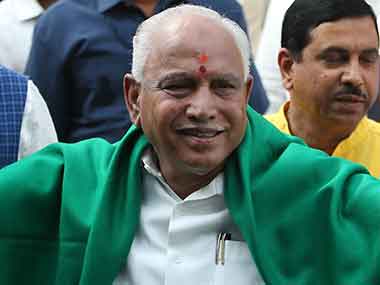With the recent Karnataka elections returning no party with a majority, the single largest party will now have to find enough MLAs to ensure it crosses the magic 112 seat mark. The BJP currently has 104 seats, eight seats short of majority. Only one independent MLA has announced support, the Karnataka Pragnyavantha Janatha Party has one seat and the Bahujan Samajwadi Party has one seat. Even if BJP convinces these parties to join their coalition, they will still be short of five seats to win a vote of confidence. This means that India’s anti-defection law comes into play. The anti-defection law has been entrenched in the Tenth Schedule to the Constitution of India. If the BJP is to win the confidence vote, it will either have to get the JD(S) to support it or poach MLAs from the JDS and the Congress. The JDS and Congress have announced a post-poll alliance and therefore, the situation seems to be tough for the saffron party. [caption id=“attachment_4473211” align=“alignleft” width=“380”] File image of BJP leader BS Yeddyurappa. AP[/caption] Before we look at the anti-defection law, we need to understand what a whip is. A whip is when the party whip or the party leader issues a clear instruction to the members of a party to vote a certain way on a motion or an issue. Sometimes, the whips can be called off by a party for what is known as a “conscience vote”. In India, such a vote is rare and legislators are required to vote in accordance with party lines. The anti-defection law provides that an MLA or an MP, as the case may be, will be automatically disqualified from their membership of the House if they give up their membership in the political party or they disobey a party whip without prior permission from the party. The concerned party here is the party which issued the ticket prior to them being voted in or a party to which they first become a member after being elected.
So, if the Congress and JD(S) issue a whip to vote against the confidence motion for the government and certain legislators defect, they will lose their seats.
The anti-defection disqualification will not apply in the event there is a “party split”, in which case one faction leaves the party, but the Tenth Schedule states that a minimum of one third of the party’s legislators are required to defect for a party split to come into play. The Tenth Schedule is also clear that it is the Speaker of the House that has the final say in a defection complaint. Proceedings of a House of legislature are protected by parliamentary privilege so courts can’t review them. The Speaker’s word is final. So, how does this play in as far as Karnataka is concerned? Before the confidence vote can happen, the Speaker has to be elected if the Congress-JD(S) alliance elects a Speaker of its choice, which it can as it has a simple majority for electing the Speaker. If this happens and the two parties issue a direction that the MLAs vote against the motion, the leaders who defect would have vacated their seats in the House and there would be by-elections again for those seats. So the MLAs run a big risk in the event they disobey the party whip. So while trying to co-opt MLAs for the confidence vote, the BJP has a tricky line to walk.


)
)
)
)
)
)
)
)
)



